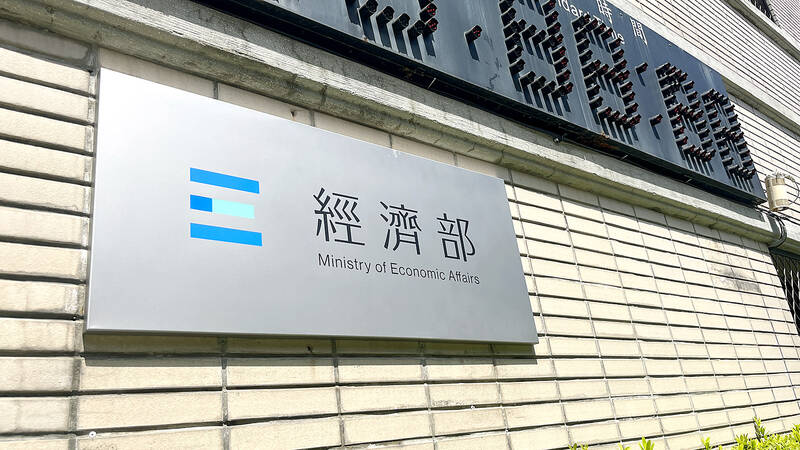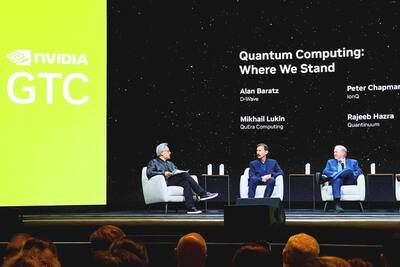The ratio of orders fulfilled by Taiwanese manufacturers overseas has consistently declined over the past several years after US President Donald Trump initiated a trade dispute with China during his first term and the release of ChatGPT sparked an artificial intelligence (AI) boom, causing many companies to shift operations back home, the latest export order statistics showed.
Export orders include orders received by local manufacturers’ local headquarters and overseas operations. Last month, 48.2 percent of all orders received by Taiwanese firms were produced in overseas factories, down 0.3 percentage points year-on-year and hitting the lowest level for the same month since 2009, the Ministry of Economic Affairs said in a report on Tuesday.
The ministry attributed the decline mainly to information and communications technology (ICT) companies increasing domestic production of servers.

Photo: Liao Chia-ning, Taipei Times
For the whole of last year, 48.6 percent of all orders received by local firms were produced overseas, the lowest level since 2010, it said.
The ratio has continued to decline from 2016, when it was 54.6 percent, indicating that local companies are relocating production from China and other regions due to tariffs, geopolitical tensions, and other cost and infrastructure considerations.
The ICT industry and the mechanical engineering sector led others by reporting that 81 percent and 70.3 percent of their export orders respectively were fulfilled by their overseas production bases last year, the data showed.
However, the figure for the ICT industry fell for the sixth consecutive year, while the figure for mechanical engineering also declined from a peak of 75.2 percent in 2019, the data showed.
The data also showed a general downward trend for other industries — such as electronic products, base metals, plastic and rubber products, chemicals, optical devices and machinery equipment.
However, close observation is warranted on the impact on firms’ overseas deployments from Trump’s pledge to bring manufacturing back to the US, as the details of his tariff policy remain unclear, the ministry said.

Anna Bhobho, a 31-year-old housewife from rural Zimbabwe, was once a silent observer in her home, excluded from financial and family decisionmaking in the deeply patriarchal society. Today, she is a driver of change in her village, thanks to an electric tricycle she owns. In many parts of rural sub-Saharan Africa, women have long been excluded from mainstream economic activities such as operating public transportation. However, three-wheelers powered by green energy are reversing that trend, offering financial opportunities and a newfound sense of importance. “My husband now looks up to me to take care of a large chunk of expenses,

SECTOR LEADER: TSMC can increase capacity by as much as 20 percent or more in the advanced node part of the foundry market by 2030, an analyst said Taiwan Semiconductor Manufacturing Co (TSMC, 台積電) is expected to lead its peers in the advanced 2-nanometer process technology, despite competition from Samsung Electronics Co and Intel Corp, TrendForce Corp analyst Joanne Chiao (喬安) said. TSMC’s sophisticated products and its large production scale are expected to allow the company to continue dominating the global 2-nanometer process market this year, Chiao said. The world’s largest contract chipmaker is scheduled to begin mass production of chips made on the 2-nanometer process in its Hsinchu fab in the second half of this year. It would also hold a ceremony on Monday next week to

TECH CLUSTER: The US company’s new office is in the Shalun Smart Green Energy Science City, a new AI industry base and cybersecurity hub in southern Taiwan US chip designer Advanced Micro Devices Inc (AMD) yesterday launched an office in Tainan’s Gueiren District (歸仁), marking a significant milestone in the development of southern Taiwan’s artificial intelligence (AI) industry, the Tainan City Government said in a statement. AMD Taiwan general manager Vincent Chern (陳民皓) presided over the opening ceremony for the company’s new office at the Shalun Smart Green Energy Science City (沙崙智慧綠能科學城), a new AI industry base and cybersecurity hub in southern Taiwan. Facilities in the new office include an information processing center, and a research and development (R&D) center, the Tainan Economic Development Bureau said. The Ministry

Nvidia is to open a quantum computing research lab in Boston, where it plans to collaborate with scientists from Harvard University and the Massachusetts Institute of Technology, Nvidia CEO Jensen Huang (黃仁勳) said on Thursday. Huang made the announcement at Nvidia’s annual software developer conference in San Jose, California, where the company held a day of events focused on quantum computing. Nvidia added the program after Huang in January said that useful quantum computers are 20 years away, comments that he sought to walk back on Thursday while joined onstage by executives from quantum computing firms. “This is the first event in history